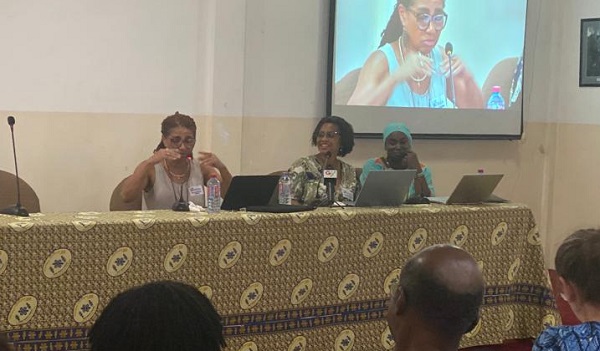
Provide mentorship for young females in academia - Prof. Keita to scholars
A Professor at the University for Arts and Human Sciences of Bamako, Mali, Fatoumata Keita, has urged African female scholars and researchers to provide mentorship to desiring young female colleagues.
This, she believes, would help to groom up many young female scholars in African higher institutions of learning in order to address gender imbalances in academia.
She said African female scholars must make a point to practically and deliberately bring up other females in academia.
Prof. Keita was speaking at a public roundtable organised by the Merian Institute for Advanced Studies in Africa (MIASA) in collaboration with the Centre for Gender Studies and Advocacy (CEGENSA) of the University of Ghana on May 29, 2024.
The event, which was held on the theme: “Re-thinking the academic environment for increasing gender-balance and inclusion" offered panelists and the audience, both in-person and online, to deliberate on how to increase and promote female academic leadership at universities across Africa.
It was in collaboration with the German Historical Institute Paris (GHIP) and the Centre for Gender Studies and Advocacy (CEGENSA), University of Ghana (UG).
The Merian Institute for Advanced Studies in Africa (MIASA) is an institute under the College of Humanities, University of Ghana. It is based on a collaboration between the University of Ghana and four German partners the University of Freiburg (leading house), the Goethe University Frankfurt, the German Institute for Global and Area Studies (GIGA), and the German Historical Institute Paris (GHIP).
The Institute is jointly sponsored by the German Federal Ministry of Education and Research (BMBF) and the University of Ghana.
The event brought together 19 early- and mid-career female academics, who are affiliated in the Social Sciences and Humanities with universities or research institutes in Ghana, Nigeria, The Gambia, Burkina Faso, Uganda, Kenya, South Africa, Botswana, Tunisia, and Morocco.
Gender policies
Prof. Fatoumata Keita also called for gender equality policies in academia to help create thriving environment for female academics.
She said women faced many barriers in their pursuit for academic achievements, noting that many female academics had to combine family duties together with their academic work, a situation, she observed, often times hindered many women from achieving their goals.
She further called on African leaders to enforce laws regarding women’s empowerment and gender equality in academia.
For Prof Keita, in terms of legal and policy framework, African leaders had done a lot by signing onto international conventions regarding gender equality, the protection of girls and human rights, but had done little to implement such policies.
“We have all the texts, so the only thing now is to implement, and enforce the laws regarding women’s empowerment and gender equality in academia,” she said.
For her part, Prof. Akosua Adomako Ampofo of the University of Ghana, who was also a panelist on the programme, said women experienced challenges that were gendered in academia.
She expressed the concern that many people think that women who acquired higher academic degrees and headed institutions were difficult to work with.
“We must stop the attitude that certain jobs were meant for women, especially now that women are contributing to the financial pot. These are challenges we put on women which we do not on the same extent put on men,” she said.
Another panelist, Prof. Clementina Baptista de Jesus Furtada of the University of Cape Verde, called for funding for female scholars to engage in research and also for capacity building.
The Director of the Centre for Migration Studies, Prof. Mary Setrana, who represented the Vice Chancellor of the University of Ghana, at the programme, said gender inequalities has displaced many female academics, be it emotional, mental or physical.
For her, the theme for the roundtable discussion aligns with the University of Ghana’s strategic plan - priority four, which is on gender and diversity.
She explained that the university “through this strategic priority aims to create the best environment for equal opportunity in gender and diversity; and the University of Ghana is committed to this.”
Touching on the programme, Prof. Setrana, said the event provided an occasion not for female scholars to lament on the unimaginable challenges “we face in our various contexts; but it is an occasion to encourage ourselves as we seek to promote and support gender equality and inclusive working academic environment.”
